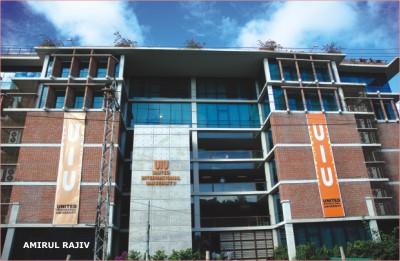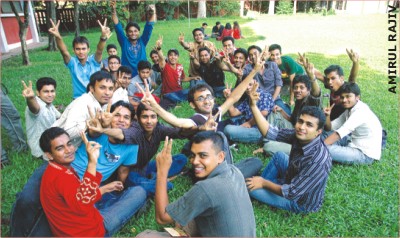
Inside
|
A little learning A.K. Enamul Haque makes the case for private education and what needs to be done to shake up the sector The state of our higher education has been under scrutiny by many. The University Grants Commission, academia, students, and also the press are asking a very simple question: Is the quality of education at the private universities OK? While nobody can answer this question with any degree of confidence (since no systematic research has been done), some (in power) claim that they have the answer. As a result, they are tightening the rope around the private university system, and, as such, suffocating it. Good practices
Third, private universities have made the curriculum flexible to adapt to the changes in the market conditions. For example, it was due to our effort at NSU that the Master's in Development Studies was launched in the country for the first time. Fourth, private universities have also established the practice that teachers should have at least two more degrees than their students (a widely practiced system in the North American system of education). And fifth, a few private universities have also included a mandatory research component in their Bachelor's programs, which public universities are yet to emulate. Quality of education It can still be argued that the universities must meet a common minimum standard, and for this one needs to ensure a quality assurance program. This is an argument I often buy, and I would like to emphasise that the need for supervision or overseeing of the private universities is as important as it is for public universities. Let us not forget that the standardisation process should be designed to guarantee a minimum standard only. Critics also argue that it is for this reason that private universities are being "watched" by the University Grants Commission. While there is a valid reason for such activities of the UGC, let us not forget that the process is equally valid for public universities. At the same time, it can be argued that, despite all the efforts of the University Grants Commission, the quality of education in public universities is deteriorating fast, too. As such, we need to question the validity of the tools used by the government to monitor the quality of education. What are these tools? Well, it is often not public in its entirety. Some of the tools used by UGC are: a) space, b) facilities (library, labs, co-curricular facilities, etc), c) quality of education for hiring faculty members, d) minimum quality of education for admitting students, e) uniform grading scheme, f) the curriculum, and g) ownership of land. Let us examine them one by one. There is no requirement of space per student. There is, however, a minimum area requirement for starting a campus. On the other hand, many good private universities maintain a maximum class size to ensure quality of education. This is not used by UGC (because public universities will not be able to meet such a standard). Facilities -- this includes lab, library, etc. Private universities provide easy access to these facilities, and they do it because they charge their students for using them. Good private universities use student clubs to organise co-curricular activities of the students. The UGC never takes account of such activities to measure the quality, rather it sees the presence or absence of the facilities. Does it matter whether a university has a play-ground, a swimming pool, or a stadium, if it is not used? Such facilities are rarely used in public universities, and yet we believe that they are a measure of the quality of life in the campus. Moreover, private universities subscribe to internet libraries and e-journals, which are not in the libraries, and yet the UGC counts books in the library to measure the standard. Is this fair? A minimum standard for hiring faculty members is an important criterion for maintaining quality of education. This should be strictly monitored, and it should be done for all institutions providing higher education. It is easy to show that many colleges which offer Bachelor's and Master's degree programs do not meet this standard. Yet many guardians are totally unaware of this. In fact, it is also possible to show that quite a few private universities maintain a higher standard than prescribed by the UGC. The minimum standard for admission of students to the universities is controlled by the UGC. A good university should accept the challenge of transforming weak students into scholars. In fact, under the equality of opportunity principle, it is often argued that weak groups should be given access to better educational facilities. This is based on the assumption that a better academic environment can transform students. A uniform grading scheme has been pushed by the UGC in recent times as a measure of the quality of education. A uniform system means that all universities use: a) First/Second/Third class grading scale, or b) A, B, C and D scale. For many years, Rajshahi University used a different scale for its second-class graduates, and yet we did not say that it was bad or good. In fact, no conclusive evidence could be established against, or for, this principle adopted by RU. A grading scheme using A, B, C and D is used in a credit-hour based education system, where both the class contact time and the quality of performance are integrated to form a scale for performance and to measure grade point average. In the US, professors are free to choose their own scale in giving A, B, C or D in their classes. They never fix marks for grading. As a result, As are different in different universities. Eventually, an annual rating of universities is made to provide a comparison of the degrees of the universities by discipline. This system guarantees a healthy competition among competing institutions. It keeps the system flexible, and once Harvard understands that Boston, for example, is close to it in terms of standard of education, it can raise its standard for As. As a result, Harvard remains Harvard. This was not the point when the UGC made its ruling on a uniform grading system. In fact, with this new system, the UGC is now asking IBA of DU (also many private universities) to lower its scale and declare the previously declared Bs as As! What a clever idea to improve the quality of education in Bangladesh! The curriculum is an important yardstick of the quality of education. It is a dynamic system, so universities are allowed to change the curriculum through the Curriculum Committee and the Academic Council. This makes the curriculum flexible, and competing universities remain alert to make changes when required. The beauty of the system is that it automatically forces universities to improve their curriculum. On the other hand, a uniform curriculum for all is like "one size fits all." It is inflexible, backward, and forces the fossilisation of the system. Many countries have adopted an open system of evaluation of the curriculum, where experts and faculty members discuss how to improve the curriculum (rather than saying change this, change that, etc.). Unfortunately, in our case the system is hidden behind a curtain. No one knows who evaluated the curriculum presented by a university, and the UGC believes that only the experts know better than others. The UGC should respect the wisdom of faculty members (who are equally qualified), and let them face the experts to justify the curriculum. Here, it is important to realise that all BBAs, for example, are not the same, so their curricula need not be exactly same. By dittoing a curriculum from an established university one does not make a program the best. Finally, ownership of land is unnecessary. It is not linked with the quality of education. However, it is important that universities have their own campuses. Educational quality can be ensured with or without land.
Unfortunately, we are fighting about the tools. We tend to make the tool inflexible, so that there is no upper class and lower class in education. As if we are going to make every university like Harvard. This strategy helps the weaker player in the system. I hope that the new UGC team understands this while evaluating the system of education. Challenges ahead India is one of the countries which has understood this. It is now expanding its education system to accept the challenges. Singapore is another country which has been massively investing in higher education for the past five years, to cater to future demands coming from its neighbouring countries, including Bangladesh. Some of us may even be foolish enough to think that the government will be able to do more than what has been suggested above. Today, 0.15% (not 15%) of GDP is spent on higher education in Bangladesh. At this rate, the government will need to spend between Taka 888 and 2,220 crore for university education. Possible? Today, for a student studying science subjects in Dhaka University, the cost is Tk 120,000 annually (including all costs except food), for business subjects it is Tk 95,000, and for other subjects it is Tk 78,000. The government pays 90% of the costs. In terms of number of teachers, we will need between 3,000 and 5,000 qualified faculty members to meet the challenge. Are we listening? I guess not. We need to strengthen our university education in many ways. Where is the regular PhD program to create university teachers? Maybe the UGC should consider allowing private universities to bring a new standard in PhD programs in Bangladesh.
Many countries in the world have developed student loan and scholarship programs to guarantee that meritorious students do not suffer due to high cost of education or lack of seats. Many countries have transformed their finest institutions into "graduate campus only," to contribute to the development of manpower needed to support the growing demand for teachers in the higher education system. Is it not a shame to see that Dhaka University, established in 1921, does not have a regular PhD program? Many countries have revamped their higher education to strengthen research capabilities to meet the challenges of the future. Many countries have developed "research grant" programs to ensure development of knowledge. As we believe that Bangladesh is becoming a "middle-income" nation, it is important that our policy makers understand the requirement to live up to the expectation of a "middle income" country in terms of its need for higher education. A.K. Enamul Haque is a Professor of Economics, East West University, Dhaka. |
 Second, private universities were the first ones (after BUET) which made the Bachelor's degree as the terminal degree of studies, and made admission into Master's degree an optional choice with a higher entry requirement. The benefit is better quality Master's degree programs in the country, whose students are now accepted around the world.
Second, private universities were the first ones (after BUET) which made the Bachelor's degree as the terminal degree of studies, and made admission into Master's degree an optional choice with a higher entry requirement. The benefit is better quality Master's degree programs in the country, whose students are now accepted around the world. 
